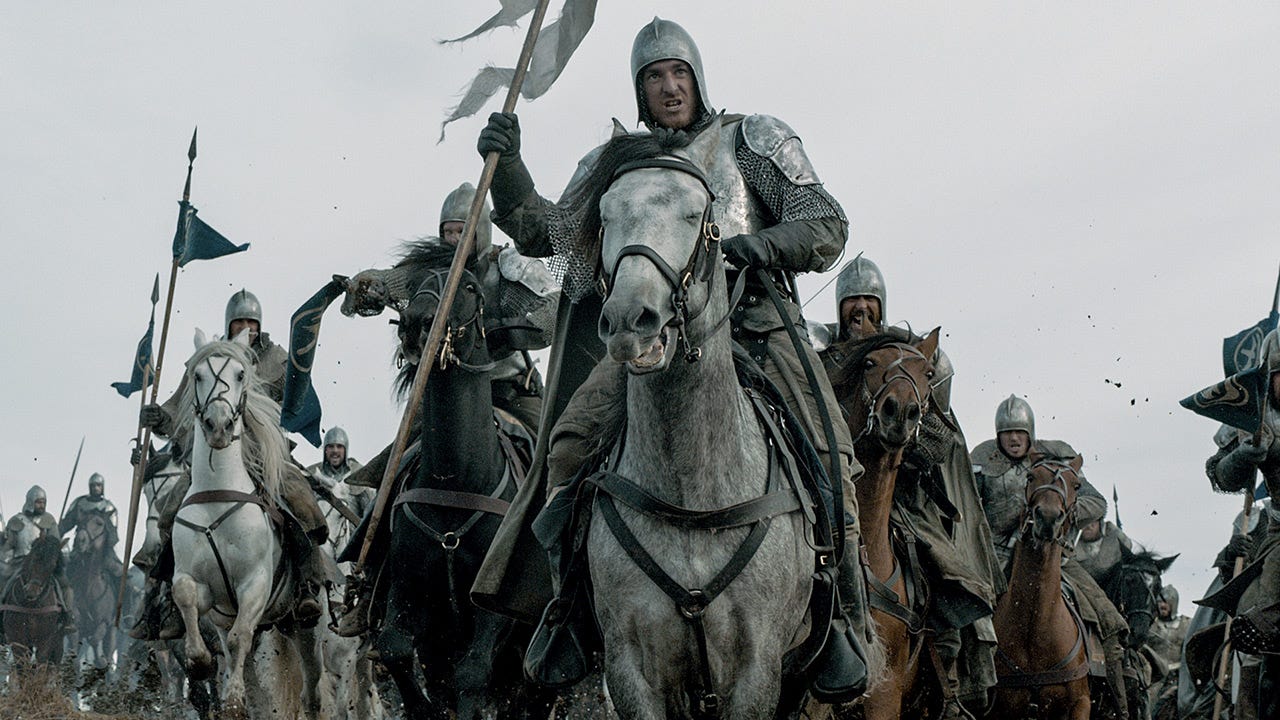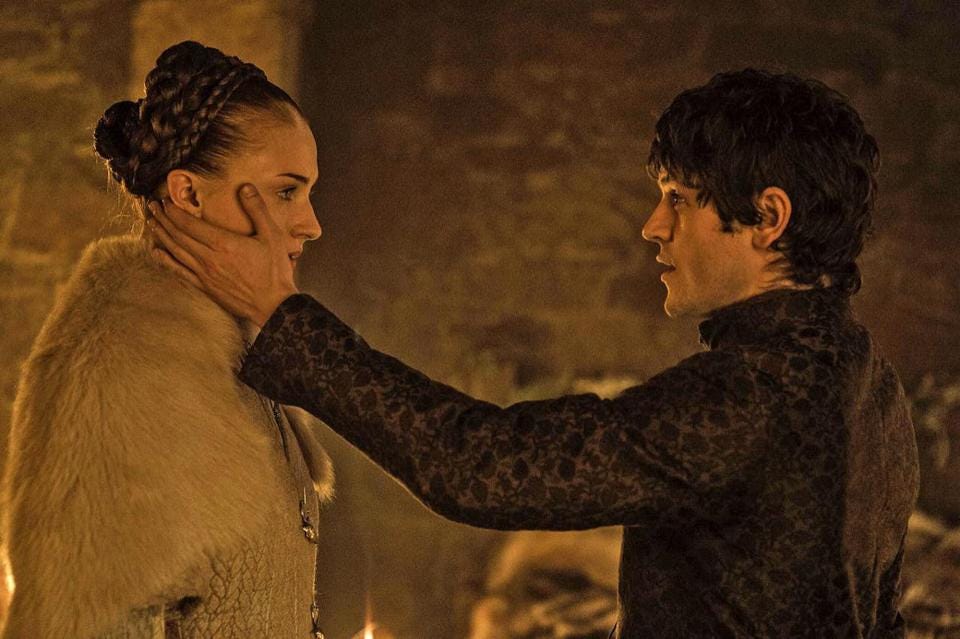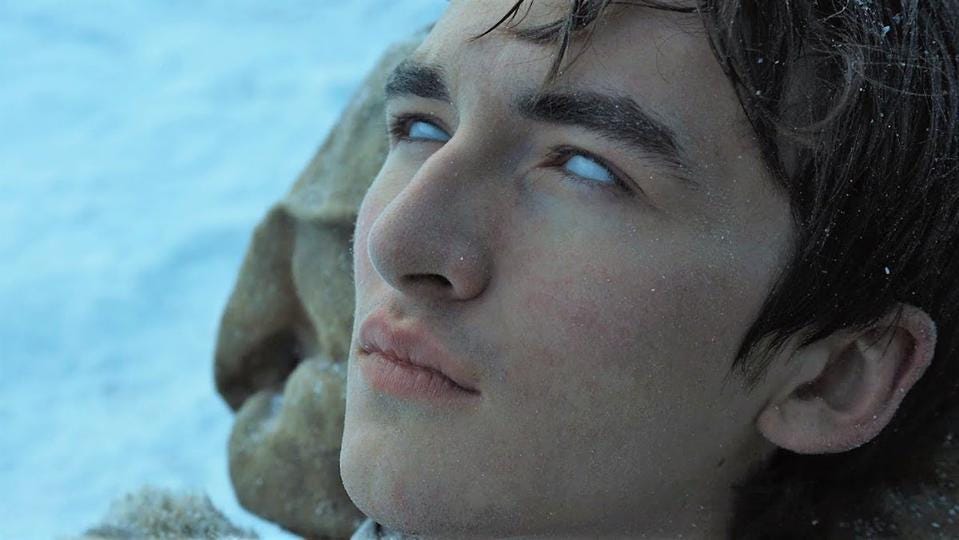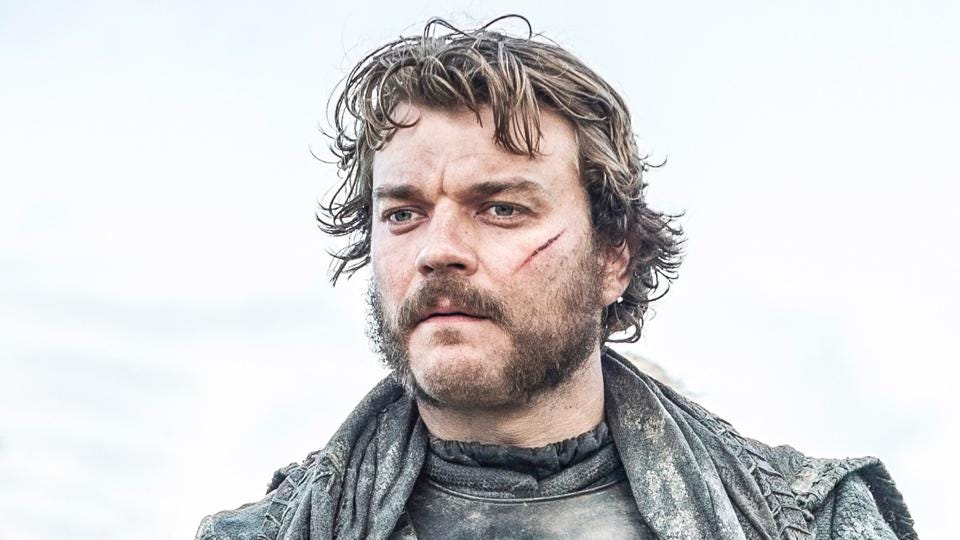Why 'A Song Of Ice And Fire' Will End Very Differently Than 'A Game Of Thrones'
Not only will George R.R. Martin spin a much more complex narrative web, the myriad changes to the adaptation guarantee a totally different outcome. If Martin ever finishes his books, that is.
Recently, George R.R. Martin announced that his two remaining maybe-releasing-someday A Song Of Ice And Fire books will end very differently from the HBO adaptation Game Of Thrones.
Writing on his blog, Martin said that his writing process is like gardening. You plant the stories and see how they grow. You tend to your characters and plotlines but you can’t predict everything. This has been a recurring theme in Martin’s discussion of writing. He has talked about how he knows the broad-strokes of the story will end, but the road to that ending winds through many uncertain bends and passes.
“What I have noticed more and more of late, however, is my gardening is taking me further and further away from the television series. Yes, some of the things you saw on HBO in GAME OF THRONES you will also see in THE WINDS OF WINTER (though maybe not in quite the same ways)… but much of the rest will be quite different.”
Of course, in many ways those of us who have read the books already know that this would be the case, simply because of the enormous changes the showrunners made to adapt Game Of Thrones into a TV show—some good, some bad. Here are five of the most impactful changes that all but necessitate a fundamentally different ending. There are many more changes than these, but these alone mean the ending of the books will be vastly different from the show.
Spoilers ahead, obviously.
1. Sansa Never Marries Ramsay Bolton
I’ve long argued that HBO’s Game Of Thrones jumped the shark not in its shoddy 7th season and not during the execrable final season, but rather the moment Littlefinger took Sansa Stark and pawned her off on the Boltons for no good reason whatsoever. This was an “out of the frying pan into the fire” moment for Sansa. For Littlerfinger it was . . . a huge loss that earned him nothing whatsoever—a political maneuver so stupid and shortsighted that one can’t really call it a maneuver at all.
Littlefinger keeping Sansa for himself as part of his bid to become the lord of the Eyrie and take over House Arryn makes sense. She is the daughter of one of the most powerful Houses in Westeros and niece to Lady Arryn, Catelyn Stark’s sister. Littlefinger was in love with Catelyn and sees her in Sansa. There is simply nothing strategic about giving her over to the wicked Boltons. The Boltons, meanwhile, hatch their own plan and have Ramsay marry Jeyne Pool and then lie about it and claim that she’s Arya Stark.
This makes sense for the Boltons. It strengthens their claim to Winterfell which is tenuous at best after their betrayal of their former lord and the murder of Robb Stark at the Red Wedding. The lie is part of the wonderful intrigue that makes Martin’s work so compelling. Having Sansa actually be married to Ramsay makes absolutely no sense, and it was at that moment that I realized the showrunners were not nearly clever enough to pull this off.
In any case, we have no idea what will happen with Sansa who remains at the Eyrie with Littlefinger when we last saw her in the books. But it won’t be the stupid crap we got in the show with her and Arya “fooling” Baelish in one of the worst, most ham-fisted storylines of the later seasons. Thank the gods.
2. Lady Stoneheart Is Nowhere To Be Seen
Catelyn Stark is killed along with her son and his wife at the Red Wedding but in the books she doesn’t stay dead—well, not entirely dead anyways.
Lady Stark returns as a vengeful, undead version of herself called Lady Stoneheart, and she joins up and takes charge of the Brotherhood Without Banners (not to be confused with the Brotherhood Without Manners).
When the Brotherhood finds Catelyn’s body, the Stark guardsman Harwin begs the red priest Thoros to raise her from the dead but he refuses, saying that she’s been dead too long. The outlaw knight Beric Dondarrion—who Thoros has resurrected numerous times—gives up his lifeforce to raise Catelyn instead.
She returns horribly mutilated, her wounds not healed, the slit in her throat still there, and her former personality lost altogether. She is ruled entirely by her desire for vengeance and the Brotherhood—or what remains of it—become villains, hanging anyone Lady Stoneheart believes is guilty even without proof.
One suspects that Lady Stoneheart will impact the final outcome of these books in some big, important ways—perhaps she will encounter some of her children at one point. Her absence from the TV show didn’t seem to matter much but that’s only because we really don’t know what her significance to the stories actually is.
3. The Stark Kids Were All Wargs
This was a huge and unfortunate change to the show. Each of the Stark children has their own Direwolf in both the books and the show, though Sansa’s is killed early on because of the wretched Joffrey and useless king Robert.
In the show, only Bran can ‘warg’ into his wolf Summer. But in the books, this is a trait that each of the children has to one degree or another. Arya dreams of her wolf Nymeria in vivid detail (because she is actually warging into the wolf without realizing). Jon Snow learns how to warg into Ghost though he mostly does so unconsciously.
Presumably Rickon also has this ability though we know so little about the youngest Stark that it’s hard to say for sure.
Regardless, these are important powers that will almost certainly shape the ending for these characters and the story writ large.
4. The Entire Dorne Storyline
I won’t even go over all the ways Game Of Thrones botched the entire Dornish storyline (other than the magnificent portrayal of Oberyn ‘The Viper’ Martell by Pedro Pascal).
Basically, Dorne is a power player in the books. Sunspear is pretty much independent, only nominally paying homage to the king in King’s Landing. The Dornish ruler is styled a ‘prince’ rather than a lord and Dorne has a powerful army that hasn’t entered into the fray (yet). Dorne bides its time and Prince Doran Martell plays a long game, sending his son Quentyn to woo Daenerys into a politically powerful marriage.
There is no poisoning of Myrcella Baratheon, who is on her way back to King’s Landing when we last see her. And Quentyn never shows up in the show so we never get his doomed quest and whatever impact that may have on Dornish feelings toward Daenerys.
Sidelining almost all of the Dornish plot might have made sense to keep the show from ballooning too large, but there will be far-reaching differences in Martin’s books because of it.
5. Aegon / Young Griff
Another character wholly absent from the show is Aegon, another Targaryen heir who Illyrio and Varys are attempting to seat on the Iron Throne. There are many theories about Aegon and his true identity. He may be a Blackfyre and not a Targaryen at all—the “false dragon.” But we simply don’t know for sure what his true identity is yet, with clues pointing either direction.
Throughout much of A Dance With Dragons, Tyrion accompanies Aegon—who he knows at first as Young Griff—on the way to meet the mercenary army the Golden Company. By the end of the book, they’ve sailed to the Stormlands and are preparing to take Storm’s End.
Aegon declares himself Aegon VI, King of the Andals, the Rhoynar, and the First Men. This is obviously a pretty big deal given Daenerys’s own claim to the throne (not to mention Jon Snow’s probable true identity).
Clearly having another claimant to the Iron Throne—one wholly absent from the TV show—will have a massive impact on the way the books’ ending plays out.
6. The Greyjoys
Like Dorne, the Greyjoy plotline was changed in big and fundamental ways. Euron Greyjoy is King of the Iron Islands and not in Cersei’s pocket, but rather looking to find Dany’s dragons and use them to conquer all of Westeros.
His brother Victarion is just as important a character in the books but is left out of the show entirely. Victarion is sent by Euron to court Daenerys in Euron’s name, but he plans instead to wed her himself out of spite.
One hugely important piece of this story is the Dragon Horn which Euron gives to Victarion when he sets off on his quest. The horn—called Dragonbinder—apparently has the power to control dragons, and was likely one of the sorcerous tools used in Valyria to help dragonriders control their beasts.
Obviously a half-mad Greyjoy zealot with such a powerful magical item will have a major impact on Dany’s storyline and the ending of the books.
Oh, and Asha Greyjoy is a much better character in the books than Yara is in the show. I doubt very much that her story will go the same route as her show counterpart.
7. The Night King
Finally, there is no Night King in A Song Of Ice And Fire. There is a legend of the Night’s King but he is not the recognizable leader of the White Walkers (the Others in the books). The show propped up the Night King as the Big Bad for a long time before totally wasting that entire storyline in a murky battle scene with a silly outcome.
I have no idea what will happen with the Wall or the Others or Bran or Jon Snow or any of that in the books, but this villain isn’t in them so clearly whatever happens it will be wildly different. Again, hopefully for the better because good grief that was a disappointing end to a once-great show.
One last point to make: In Martin’s post he points out that all the complexities in the books compared to the shows is “part of why WINDS is taking so long. This is hard, guys.”
It is certainly an enormous and daunting task, one that is taking Martin over a decade to complete. And that’s just for Winds of Winter. With a seventh and final book still to pen, I find myself more and more concerned that the biggest difference between the end of the books and the end of the show is simply that the show actually had an ending at all—however bad it ended up being.
I hope I’m wrong and I hope we get both these novels and I hope they’re brilliant and mind-blowing. But I don’t want to get my hopes up too high, either.
Of course, now we also have House Of The Dragon airing weekly on HBO, so at the very least we get to revisit Westeros—albeit in a different time and age. You can read my guide to that show here on diabolical. The new prequel show is based off of Martin’s Fire & Blood fantastical history of the Targaryen dynasty, which is also worth a read.
You should also consider reading Joe Abercrombie’s fantasy series, beginning with The Blade Itself. It’s one of the best, and has surpassed Martin’s series in my ranking of the best fantasies out there.










Don't Jon and Dany meet a Dragonstone in the show, not Storm's End? I thought we never saw Storm's End in the show.
Link clicked and Abercrombie book purchased for my daughter who loves this genre, merci!